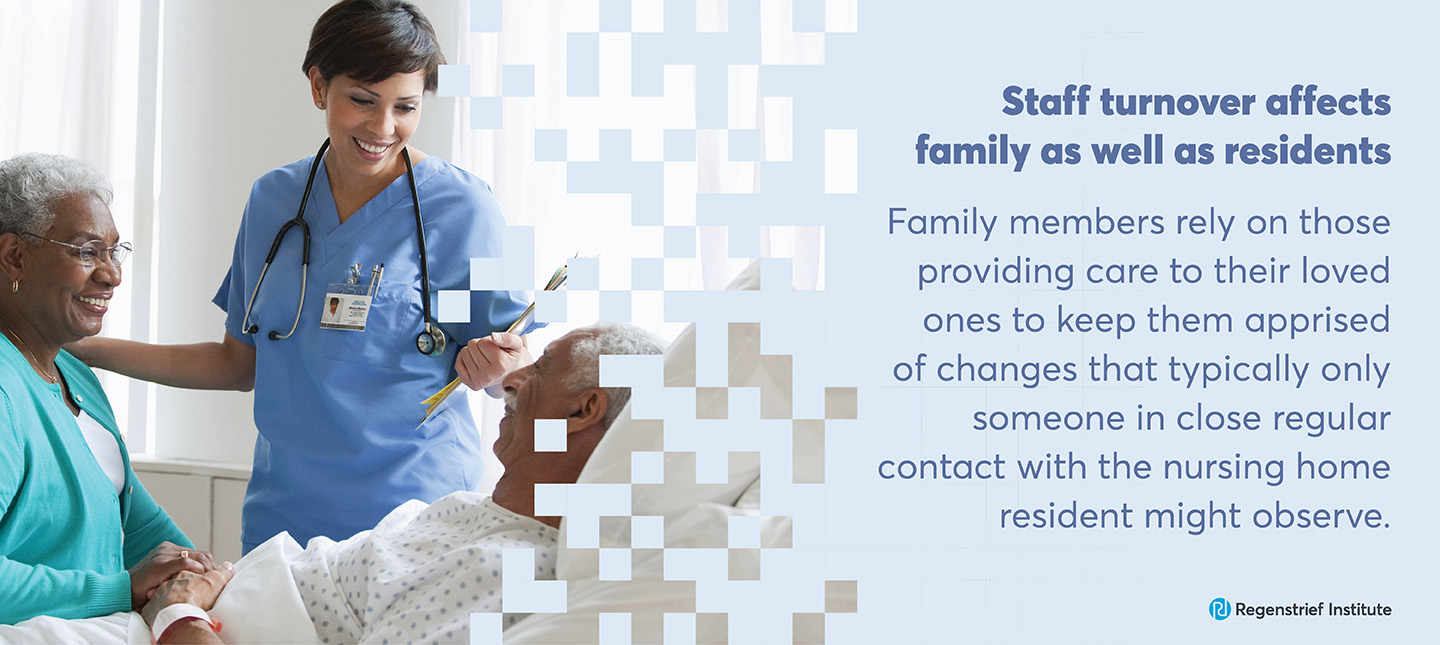Continuity of care important for vulnerable population that resides in nursing homes
The pandemic has called attention to an issue that nursing home residents, their families and those who work in nursing homes have been aware of for a long time. Recruiting and retaining both the nursing home staff who provide the very personal care needed by residents and the administrators who set the tone of the workplace are key challenges in nursing homes.
Regenstrief Institute and Indiana University School of Medicine researcher-clinicians, Jennifer L. Carnahan, M.D., MPH, and Kathleen Unroe, M.D., MHA, add that continuity of nursing home staff and of leadership is linked to improving quality of resident care — from onsite treatment or post-hospital care for complex medical issues to assistance with basic care needs such as eating and bathing. Their editorial, “Prioritizing nursing home staff and leadership consistency to improve quality,” is published in Journal of the American Geriatrics Society (JAGS).
An ongoing trust relationship with nursing home staff enables residents to feel comfortable with the very personal care they require and enables the hardworking caregiver to know and interact skillfully with residents as individuals rather than focusing just on tasks.
Staff turnover affects the family as well as residents. Family members rely on those providing care to their loved ones to keep them apprised of changes that typically only someone in close regular contact with the nursing home resident might observe. These might be subtle mood changes, loss of interest in previously enjoyed activities or inability to perform a task with which they had not previously had a problem.
“Doctors and nurses are obviously important, but it should be recognized that frontline nursing home staff deliver 90 percent of care and thus are critical to creating a high-quality long-term care system,” said Dr. Unroe. “Everyone agrees we have a recruitment and retention problem. We need to devise incentives to attract and keep people in this workforce who enjoy working with older adults, and are well trained, especially in the needs of people with dementia.”
Dr. Unroe, a geriatrician, and a past chair of the American Geriatrics Society Public Policy Committee, currently serves as a member of the technical expert panel of the Centers for the Medicare & Medicaid Services (CMS) Five-Star Quality Rating System. The online tool provides more than 100 quality metrics divided into five categories: mortality, safety of care, readmission to hospitals, patient experience and timely and effective care. These measurements enable older adults, their families, social services and others to evaluate and compare quality of care provided to residents.
“We need to prioritize nurturing and supporting staff so that they can deliver the hands-on care nursing home residents require,” said editorial co-author Dr. Carnahan. “Given the importance of continuity to quality of care for this vulnerable population and the current lack of viable solutions to improve staff and leadership recruitment and retention, researchers, in partnership with nursing home operators, must take the lead in developing and testing practical and reproduceable strategies to attract and keep a talented workforce and leadership.”
Dr. Carnahan, a geriatrician, is a current Leadership in Health Policy scholar with the Society of General Internal Medicine and serves on the society’s Geriatrics Commission.
About Jennifer L. Carnahan, M.D., MPH, M.A.
In addition to her role as a research scientist at Regenstrief Institute, Jennifer Carnahan, M.D., MPH, M.A., is an assistant professor of medicine at Indiana University School of Medicine and a practicing geriatrician.
About Kathleen T. Unroe, M.D., MHA
In addition to being a research scientist at Regenstrief Institute, Kathleen Unroe, M.D., MHA, is an associate professor of medicine at Indiana University School of Medicine and a practicing geriatrician in the nursing home setting.
About Regenstrief Institute
Founded in 1969 in Indianapolis, Regenstrief Institute is a local, national and global leader dedicated to a world where better information empowers people to end disease and realize true health. A key research partner to Indiana University, Regenstrief and its research scientists are responsible for a growing number of major healthcare innovations and studies. Examples range from the development of global health information technology standards that enable the use and interoperability of electronic health records to improving patient-physician communications, to creating models of care that inform practice and improve the lives of patients around the globe.
Sam Regenstrief, a nationally successful entrepreneur from Connersville, Indiana, founded the institute with the goal of making healthcare more efficient and accessible for everyone. His vision continues to guide the institute’s research mission.
About IU School of Medicine
IU School of Medicine is the largest medical school in the U.S. and is annually ranked among the top medical schools in the nation by U.S. News & World Report. The school offers high-quality medical education, access to leading medical research and rich campus life in nine Indiana cities, including rural and urban locations consistently recognized for livability.










